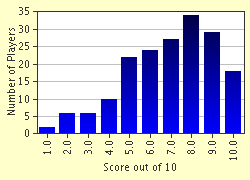Quiz Answer Key and Fun Facts
1. The origin of this word is unclear, but it is probably an anagram of "magic". Its first meaning is listed as "a piece of a magician's apparatus".
2. In this verb, the notion of "control" comes from the Latin word "frenum" meaning "bridle". It was first recorded in the sense of "to restrain a thought or feeling".
3. This word, referring to a leisurely walk in public, comes from French, as do so many English words.
4. This word for a large mammal, such as an elephant or rhinoceros, comes from Greek roots and relates to the animal's skin type: it translates, litterally, as "thick skinned".
5. The original sense of this word, probably through Spanish, was "the surgical treatment of fractures". It takes its origins from Arabic: "al-jabr" which means "bone-setting".
6. This acronym used in US postal adresses refers to "zoning improvement plans".
7. This animal takes its English name from a variant of the Old French expression "chatepelose", literaly "hairy cat", influenced by the verb "piller", meaning "to ravage". Doesn't it sound very dangerous?
8. This word, a shortening of the Old French "estoffe" (material, furniture) and "estoffer" (to equip, to furnish a garrison), originally referred to the material used in making clothes. Its meaning has broadened to include any material, matter, idea or substance.
9. These short daggers were first made in the town of Bayonne in France, from where they took their name.
10. This derogatory term meaning "coward, effeminate person" shares roots with the Latin "soror" as well as German "schwester" and Dutch "zuster".
Source: Author
meshkenet
This quiz was reviewed by FunTrivia editor
agony before going online.
Any errors found in FunTrivia content are routinely corrected through our feedback system.
